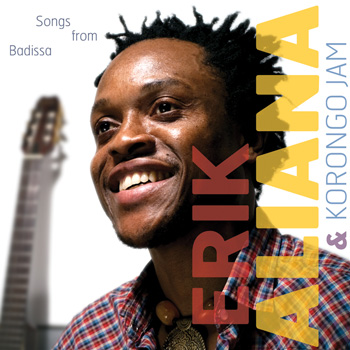Fiche Personne
Musique
 ©
©
ERIK ALIANA
Chanteur/euse, Musicien/ne, Compositeur
Cameroun
 ©
©
Site web : http://erikaliana.com/
Facebook : https://www.facebook.com/erik.aliana.3
Français
En partance pour la ville, Erik Aliana convoqua l’esprit des chamanes, le souvenir de l’enfance campagnarde, la clairvoyance et l’humour des anciens…
Les traditions musicales de son Cameroun natal, Erik Aliana les respecte, les illustre, les enrichit, les bouscule parfois. La palette chatoyante de sa voix unique donne des couleurs aux rues de la grande ville où il vit désormais, les rythmes ruraux originels scandent avec lui l’agitation urbaine. C’est de cette rencontre, de cette confrontation, entre village et mégapole que son art tire sa beauté, son authenticité, sa dimension spirituelle. Sur ce chemin exigeant et tendre, ses frères, ses alliés du Korongo Jam, redoutables ambianceurs, l’accompagnent, au plein sens du terme.
Sa vive érudition et sa douce énergie font d’Erik Aliana une figure remarquable de l’expression africaine.
Auteur-compositeur, chanteur et multi-instrumentiste, Erik Aliana revisite par son écriture musicale propre les musiques traditionnelles des peuples de la forêt et de la savane d’Afrique Centrale, notamment le bikutsi (ou kindo) chez les Béti popularisé par le légendaire groupe les Têtes Brulées au milieu des années 80. Inspirée par les fêtes et rites du village, les sons Pygmées et les ambiances de la forêt équatoriale, la musique d’Erik Aliana perpétue un héritage fragile en même temps qu’elle renouvelle la création musicale africaine.
S’il vit aujourd’hui à Paris, Erik Aliana a grandi entre Yaoundé et Badissa, le village d’où il est originaire dans la province du Centre-Cameroun. Deux clivages culturels et deux modes de vie qui ont marqué sa manière d’appréhender la musique… C’est ainsi que son talent s’exprime aussi et surtout, dans le mélange des genres et des époques lorsqu’il mêle polyrythmies traditionnelles à des touches jazz, funk ou cha cha cha… Ses textes chantés en o’sananga, français et anglais (pidgin), dépeignent une Afrique belle et bien vivante, et traitent de sujets de société actuels, inspirés par la sagesse des anciens.
Après des débuts remarqués au Cameroun, Erik Aliana et son groupe le Korongo Jam traversent le continent africain (MASA, FESPAM). En 2003, il est la révélation des Musiques Métisses d’Angoulême pour sa première grande tournée européenne, suivie en 2005 par les Etats-Unis (Festival de Louisiane). Entre 2006 et 2010, c’est le Japon et la Corée du Sud où il se produit chaque année (Festival Sukiyaki Meets The World, Gwangju International Festival). Parallèlement, il participe en 2008 à la création du conte musical « L’enfant pirogue et l’homme crocodile » aux côtés de Manu Dibango, avant d’être à l’affiche d’un projet créatif unique Asie-Afrique (2011/2012), aux côtés de la chanteuse Zimbabwéenne Chiwoniso, baptisé du titre d’une de ses chansons : Sukiafrica.
Son premier album « Just African » (2006) a été soutenu par l’UNESCO et l’AFAA (ex-Institut Français). En 2011, il signe chez le label Buda Musique avec l’album « Songs from Badissa » qui sort en sélection FIP : «Un chant qui emprunte toutes les nuances et sillonne d’infinies vibrations, de voix entrecroisées en polyphonies de dentelle, des rythmes qui frottent allégrement leurs complexités, des instruments traditionnels aux sonorités boisées, des flûtes, bruitages, chuintements, sifflements… Ce que l’on saluera surtout dans ce disque solaire et subtil? Son architecture fine, et l’incontestable talent d’arrangeur d’Erik Aliana. Songs from Badissa s’écoute sans modération» Anne-Laure Lemancel, RFI musique.
En 2013, il est de retour en studio pour enregistrer son troisième album « Just My Land » (Buda Records) dans les conditions du Live. Sorti en novembre 2013, l’album est en sélection FIP et présenté à l’occasion du Festival Au Fil des Voix à Paris en février 2014.
« Du bikutsi au makossa, le chanteur camerounais continue, sur l’album Just My Land, ses allers-retours alertes et volatils entre son village natal dans la forêt équatoriale et l’effervescence urbaine de Yaoundé. Sa voix souple, sensible, et son aura de conteur font le reste, dans un mélange de guitares funky, de flûtes pygmées et de frappes boisées (balafons…) à la mystique joyeuse. »
Anne Berthod, Télérama (« on a vu, on aime beaucoup »).
http://www.erikaliana.com
Les traditions musicales de son Cameroun natal, Erik Aliana les respecte, les illustre, les enrichit, les bouscule parfois. La palette chatoyante de sa voix unique donne des couleurs aux rues de la grande ville où il vit désormais, les rythmes ruraux originels scandent avec lui l’agitation urbaine. C’est de cette rencontre, de cette confrontation, entre village et mégapole que son art tire sa beauté, son authenticité, sa dimension spirituelle. Sur ce chemin exigeant et tendre, ses frères, ses alliés du Korongo Jam, redoutables ambianceurs, l’accompagnent, au plein sens du terme.
Sa vive érudition et sa douce énergie font d’Erik Aliana une figure remarquable de l’expression africaine.
Auteur-compositeur, chanteur et multi-instrumentiste, Erik Aliana revisite par son écriture musicale propre les musiques traditionnelles des peuples de la forêt et de la savane d’Afrique Centrale, notamment le bikutsi (ou kindo) chez les Béti popularisé par le légendaire groupe les Têtes Brulées au milieu des années 80. Inspirée par les fêtes et rites du village, les sons Pygmées et les ambiances de la forêt équatoriale, la musique d’Erik Aliana perpétue un héritage fragile en même temps qu’elle renouvelle la création musicale africaine.
S’il vit aujourd’hui à Paris, Erik Aliana a grandi entre Yaoundé et Badissa, le village d’où il est originaire dans la province du Centre-Cameroun. Deux clivages culturels et deux modes de vie qui ont marqué sa manière d’appréhender la musique… C’est ainsi que son talent s’exprime aussi et surtout, dans le mélange des genres et des époques lorsqu’il mêle polyrythmies traditionnelles à des touches jazz, funk ou cha cha cha… Ses textes chantés en o’sananga, français et anglais (pidgin), dépeignent une Afrique belle et bien vivante, et traitent de sujets de société actuels, inspirés par la sagesse des anciens.
Après des débuts remarqués au Cameroun, Erik Aliana et son groupe le Korongo Jam traversent le continent africain (MASA, FESPAM). En 2003, il est la révélation des Musiques Métisses d’Angoulême pour sa première grande tournée européenne, suivie en 2005 par les Etats-Unis (Festival de Louisiane). Entre 2006 et 2010, c’est le Japon et la Corée du Sud où il se produit chaque année (Festival Sukiyaki Meets The World, Gwangju International Festival). Parallèlement, il participe en 2008 à la création du conte musical « L’enfant pirogue et l’homme crocodile » aux côtés de Manu Dibango, avant d’être à l’affiche d’un projet créatif unique Asie-Afrique (2011/2012), aux côtés de la chanteuse Zimbabwéenne Chiwoniso, baptisé du titre d’une de ses chansons : Sukiafrica.
Son premier album « Just African » (2006) a été soutenu par l’UNESCO et l’AFAA (ex-Institut Français). En 2011, il signe chez le label Buda Musique avec l’album « Songs from Badissa » qui sort en sélection FIP : «Un chant qui emprunte toutes les nuances et sillonne d’infinies vibrations, de voix entrecroisées en polyphonies de dentelle, des rythmes qui frottent allégrement leurs complexités, des instruments traditionnels aux sonorités boisées, des flûtes, bruitages, chuintements, sifflements… Ce que l’on saluera surtout dans ce disque solaire et subtil? Son architecture fine, et l’incontestable talent d’arrangeur d’Erik Aliana. Songs from Badissa s’écoute sans modération» Anne-Laure Lemancel, RFI musique.
En 2013, il est de retour en studio pour enregistrer son troisième album « Just My Land » (Buda Records) dans les conditions du Live. Sorti en novembre 2013, l’album est en sélection FIP et présenté à l’occasion du Festival Au Fil des Voix à Paris en février 2014.
« Du bikutsi au makossa, le chanteur camerounais continue, sur l’album Just My Land, ses allers-retours alertes et volatils entre son village natal dans la forêt équatoriale et l’effervescence urbaine de Yaoundé. Sa voix souple, sensible, et son aura de conteur font le reste, dans un mélange de guitares funky, de flûtes pygmées et de frappes boisées (balafons…) à la mystique joyeuse. »
Anne Berthod, Télérama (« on a vu, on aime beaucoup »).
http://www.erikaliana.com
English
Before leaving to the city, Erik Aliana summoned the spirits of shamans, the memories of his chilhood in the countryside, and the perceptiveness and humour of elders…
Erik Aliana, singer, multi-instrumentist, respects, illustrates, enriches and shakes up the musical traditions of his native Cameroon. The dazzling range of his unique voice colours the streets of the large city where he now lives, with original rural rhythms emphasizing this urban bustle.
It is from this encounter and confrontation between village and megalopolis that he draws the beauty, authenticity and spirital dimension of his art. On this demanding and delicate path, he is fully accompanied by his brothers and allies, the awesone ambianceurs of Korongo Jam.
His sharp erudition and soft energy have earned Erik Aliana to become a key African figure.
Erik Aliana revisits, with his own songwriting, traditional music of the peoples of forest and savanna in Central Africa, including bikutsi (or kindo) of Beti, popularized by the legendary band Les Têtes Brulées in the mid 80s. Inspired by the the celebrations and rites of the village, the Pygmies sounds and the moods of the rainforest, the music of Erik Aliana perpetuates a fragile heritage at the same time it renews the African musical creation.
If he lives now in Paris, Erik Aliana grew up between Yaoundé and Badissa, the village, where he originates in the province of Center-Cameroon. Two cultural divides and two ways of life that have marked his understanding of music… His talent is expressed in a mix of genres and times when mixing traditional polyrhythms with a jazzy bass, funk touches or cha cha cha … His texts sung in Osananga, French and English, portray a beautiful and alive Africa, also deal with topics of current society inspired by the wisdom of the ancients.
After a successful start in Cameroon, Erik Aliana and his group Korongo Jam toured the African continent (MASA, FESPAM). In 2003, he appeared « the revelation » of Musiques Métisses Festival in France, for his first major European tour. Followed the USA in 2005 (Festival International de Louisiane, Californie, Nevada, etc…) with Bernard Schmidt Productions Inc. Between 2006 and 2009, this is Japan and South Korea, where he performs annually (Festival Sukiyaki Meets The World, Gwangju International Festival). In parallel, he participated in several creations whose the musical tale L’enfant pirogue et l’homme crocodile with Manu Dibango in 2008, and Sukiafrika in 2011/2012 : an Asia-Africa unique creative project named as the title of one of his songs, alongside the Zimbabwean singer Chiwoniso Maraire.
His first album « Just African » (2006) was supported by UNESCO and AFAA (Institut Français). 2011 was the year of his first collaboration with the french label Buda Musique, releasing the album Songs from Badissa . A song that borrows all the nuances and furrows infinite vibrations, polyphony of voices intertwined in lace, rhythms rubbed briskly in their complexity, traditional instruments of forested sonorities, flutes, sounds, hissings, whistling. That we salute in this solar and subtle record? Its fine architecture, and the undeniable talent of Erik Alianas arranger. Songs from Badissa is listening without moderation. Anne-Laure Lemancel RFI Musique. (Release in Selection FIP French National Radio).
In 2013, he’s back in studio to record Just My Land in live conditions. Out at the end of 2013, the album is also Selection FIP (Radio France). Erik Aliana presented his new repertory at Au Fil des Voix Paris Festival in February 2014, very well received by critics.
« It is a highly accomplished and musically sophisticated recording. The predominantly acoustic instrumentation has been sensitively produced to retain its respective natural timbres. Aliana has a strikingly beautiful voice. (…) This album takes that rural rainforest musical beauty and transports it into a technical and urban musical setting. It’s a very enjoyable, impressive and appealing fusion. » Martin Sinnock, Songlines.
http://www.erikaliana.com
Erik Aliana, singer, multi-instrumentist, respects, illustrates, enriches and shakes up the musical traditions of his native Cameroon. The dazzling range of his unique voice colours the streets of the large city where he now lives, with original rural rhythms emphasizing this urban bustle.
It is from this encounter and confrontation between village and megalopolis that he draws the beauty, authenticity and spirital dimension of his art. On this demanding and delicate path, he is fully accompanied by his brothers and allies, the awesone ambianceurs of Korongo Jam.
His sharp erudition and soft energy have earned Erik Aliana to become a key African figure.
Erik Aliana revisits, with his own songwriting, traditional music of the peoples of forest and savanna in Central Africa, including bikutsi (or kindo) of Beti, popularized by the legendary band Les Têtes Brulées in the mid 80s. Inspired by the the celebrations and rites of the village, the Pygmies sounds and the moods of the rainforest, the music of Erik Aliana perpetuates a fragile heritage at the same time it renews the African musical creation.
If he lives now in Paris, Erik Aliana grew up between Yaoundé and Badissa, the village, where he originates in the province of Center-Cameroon. Two cultural divides and two ways of life that have marked his understanding of music… His talent is expressed in a mix of genres and times when mixing traditional polyrhythms with a jazzy bass, funk touches or cha cha cha … His texts sung in Osananga, French and English, portray a beautiful and alive Africa, also deal with topics of current society inspired by the wisdom of the ancients.
After a successful start in Cameroon, Erik Aliana and his group Korongo Jam toured the African continent (MASA, FESPAM). In 2003, he appeared « the revelation » of Musiques Métisses Festival in France, for his first major European tour. Followed the USA in 2005 (Festival International de Louisiane, Californie, Nevada, etc…) with Bernard Schmidt Productions Inc. Between 2006 and 2009, this is Japan and South Korea, where he performs annually (Festival Sukiyaki Meets The World, Gwangju International Festival). In parallel, he participated in several creations whose the musical tale L’enfant pirogue et l’homme crocodile with Manu Dibango in 2008, and Sukiafrika in 2011/2012 : an Asia-Africa unique creative project named as the title of one of his songs, alongside the Zimbabwean singer Chiwoniso Maraire.
His first album « Just African » (2006) was supported by UNESCO and AFAA (Institut Français). 2011 was the year of his first collaboration with the french label Buda Musique, releasing the album Songs from Badissa . A song that borrows all the nuances and furrows infinite vibrations, polyphony of voices intertwined in lace, rhythms rubbed briskly in their complexity, traditional instruments of forested sonorities, flutes, sounds, hissings, whistling. That we salute in this solar and subtle record? Its fine architecture, and the undeniable talent of Erik Alianas arranger. Songs from Badissa is listening without moderation. Anne-Laure Lemancel RFI Musique. (Release in Selection FIP French National Radio).
In 2013, he’s back in studio to record Just My Land in live conditions. Out at the end of 2013, the album is also Selection FIP (Radio France). Erik Aliana presented his new repertory at Au Fil des Voix Paris Festival in February 2014, very well received by critics.
« It is a highly accomplished and musically sophisticated recording. The predominantly acoustic instrumentation has been sensitively produced to retain its respective natural timbres. Aliana has a strikingly beautiful voice. (…) This album takes that rural rainforest musical beauty and transports it into a technical and urban musical setting. It’s a very enjoyable, impressive and appealing fusion. » Martin Sinnock, Songlines.
http://www.erikaliana.com
Disque(s)
-
 Afrosoul #2Compilation – 2014Second voyage à la découverte des musiques Afro contemporaines, une collection de nouveautés et d’inédits réun…ERIK ALIANA est lié(e) à ce Disque en tant que chanteur/euse
Afrosoul #2Compilation – 2014Second voyage à la découverte des musiques Afro contemporaines, une collection de nouveautés et d’inédits réun…ERIK ALIANA est lié(e) à ce Disque en tant que chanteur/euse -
 Just My LandAlbum – 2013« En partance pour la ville, Erik Aliana a convoqué l’esprit des chamanes, le souvenir de son enfance campagnar…ERIK ALIANA est lié(e) à ce Disque en tant que chanteur/euse
Just My LandAlbum – 2013« En partance pour la ville, Erik Aliana a convoqué l’esprit des chamanes, le souvenir de son enfance campagnar…ERIK ALIANA est lié(e) à ce Disque en tant que chanteur/euse -
 Songs from BadissaAlbum – 2011Erik Aliana chanteur, multi-instrumentiste et auteur-compositeur, est une figure incontournable du renouvellem…ERIK ALIANA est lié(e) à ce Disque en tant que chanteur/euse
Songs from BadissaAlbum – 2011Erik Aliana chanteur, multi-instrumentiste et auteur-compositeur, est une figure incontournable du renouvellem…ERIK ALIANA est lié(e) à ce Disque en tant que chanteur/euse
Partager :



